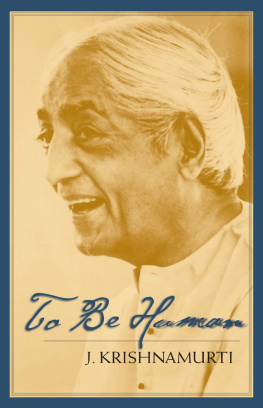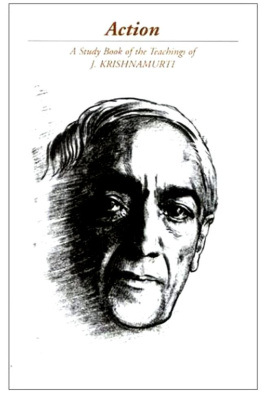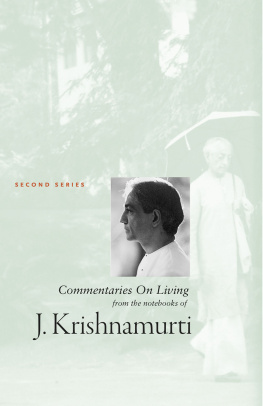Krishnamurti - To Be Human
Here you can read online Krishnamurti - To Be Human full text of the book (entire story) in english for free. Download pdf and epub, get meaning, cover and reviews about this ebook. publisher: Shambhala Publications, genre: Religion. Description of the work, (preface) as well as reviews are available. Best literature library LitArk.com created for fans of good reading and offers a wide selection of genres:
Romance novel
Science fiction
Adventure
Detective
Science
History
Home and family
Prose
Art
Politics
Computer
Non-fiction
Religion
Business
Children
Humor
Choose a favorite category and find really read worthwhile books. Enjoy immersion in the world of imagination, feel the emotions of the characters or learn something new for yourself, make an fascinating discovery.
- Book:To Be Human
- Author:
- Publisher:Shambhala Publications
- Genre:
- Rating:5 / 5
- Favourites:Add to favourites
- Your mark:
- 100
- 1
- 2
- 3
- 4
- 5
To Be Human: summary, description and annotation
We offer to read an annotation, description, summary or preface (depends on what the author of the book "To Be Human" wrote himself). If you haven't found the necessary information about the book — write in the comments, we will try to find it.
To Be Human — read online for free the complete book (whole text) full work
Below is the text of the book, divided by pages. System saving the place of the last page read, allows you to conveniently read the book "To Be Human" online for free, without having to search again every time where you left off. Put a bookmark, and you can go to the page where you finished reading at any time.
Font size:
Interval:
Bookmark:
To Be Human

J. K RISHNAMURTI
Edited by David Skitt

S HAMBHALA
Boston & London
2011
S HAMBHALA P UBLICATIONS, I NC .
Horticultural Hall
300 Massachusetts Avenue
Boston, Massachusetts 02115
www.shambhala.com
2000 Krishnamurti Foundation Trust, Ltd
Edited by David Skitt
All rights reserved. No part of this book may be reproduced in any form or by any means, electronic or mechanical, including photocopying, recording, or by any information storage or retrieval system, without permission in writing from the publisher.
For information about Foundations, Schools, and Study Centers, please write to:
Krishnamurti Foundation Trust
Brockwood Park
Bramdean, Hampshire SO24 0LQ
England
or
Krishnamurti Foundation of America
P.O. Box 1560
Ojai, CA 93024-1560
U.S.A.
www.kfa.org
Library of Congress Cataloging-in-Publication Data
Krishnamurti, J. (Jiddu), 18951986
To be human / J. Krishnamurti; edited by David Skitt.1st ed.
p. cm.
eISBN 978-0-8348-2553-6
ISBN 978-1-57062-596-1 (paper)
1. Human beings. I. Skitt, David. II. Title.
B5134.K753 T6 2000
128dc21
00-041994
Dont accept anything the speaker is saying. Test it out for yourself.

You must become liberated not because of me but in spite of me.

If you really faced the world as it is, and tackled it, you would find it something infinitely greater than any philosophy, greater than any book in the world, greater than any teaching, greater than any teacher.
J . K RISHNAMURTI
Contents

Philosophy without Boundaries

W HAT WOULD IT MEAN to talk about a rebirth of philosophy? It would have to mean something like restoring its relevance to the way that you and I live our everyday lives. It would also presuppose that the philosophy be expressed in words that are sufficiently intelligible to us, which in turn would require a passionate concern by the philosopher to communicate his or her insights as clearly and widely as possible.
Candidates without these qualifications need not apply.
A rebirth of philosophy might also be seen to demand that the word philosophy be used in its original, true sensethe love of wisdom, a word one has only to say to realize how little we use it, though it still appears, one hopes not too precariously, in the Concise Oxford English Dictionary. And how is wisdom defined? The 1995 version is experience and knowledge together with the power of applying them critically. In a previous edition it was the intelligent application of knowledge.
These definitions come surprisingly close to the heart of what Krishnamurti is talking aboutlet us call it, for the moment, his philosophy. Again and again he points to the crucial importance of applying knowledge and experience where they have their place and of not applying them where they do not, where life demands that we look and act anew. This turns out not to be as simple as it sounds. It has deep implications for the way we see and act, whether personally, socially, or politically. These implications and what prevents the human mind from performing well and harmoniously in both areas, the known and the unknown, are matters Krishnamurti tirelessly explores.
Krishnamurti is also a philosopher in the original sense in renewing the age-long debate on the nature of truth, which will no doubt seem to some of us hopelessly old-fashioned and naive and to others of us long overdue. But in general, and despite Pontius Pilates ever-skeptical What is truth? we all have to be concerned about what is true and what is not over a whole range of practical issues, whether the rights and wrongs of personal relationships or of disputes between nations. Like it or not, the notion of truth gate-crashes its way into our lives. It is also significant that when some years ago a mainstream publisher conducted a survey of general readers to discover what fundamental issues interested them most, it was truth that headed the list.
Again, it is clear that at least part of the huge public fascination in the United States with the televised O. J. Simpson trial was due to the opportunity it offered viewers to weigh evidence and determine the truth for themselves. One of the most striking incidents occurred when the prosecution showed a video to demonstrate the scientific rigor with which a forensic scientist had collected a bloodstain from a pavement. When the video ended, the defense immediately insisted it be reshown and argued that it proved precisely the oppositethe scientists incompetence. Enough to baffle any jury, what this incident revealed beyond all doubt was the crucial problem of human perceptionwe dont necessarily see what is true in the same way. Sometimes this doesnt matter and can be enriching. Sometimes we find it disturbing and annoying. On other occasions it can lead to human beings exterminating huge numbers of their own species.
So here again one can argue that by exploring the issue of truth, Krishnamurti is going back to the roots of philosophy. In the way he does it, however, he shatters the strongly entrenched academic frontiers drawn in our time between the provinces of philosophy, psychology, science, and religion. Krishnamurti will raise any issue, from any area of human activity, which he considers relevant to the way we see ourselves, others, life, and the universe. One doesnt have to share his views to feel a refreshing sense of freedom about that.
While Krishnamurti often specifically rejected for himself the term philosopher , he also expressed respect for the original meaning of philosophy as the love of truth and wisdom in ones daily life nowthis being the sense in which the term is used in the title of this introduction. Why did he reject the current usage? Perhaps there is a clue in a talk he gave a few years before his death in 1986. He had put the question to his audience: What is beyond all time, what is the source, the origin of all creation? Many of us would find this an arresting question, though some of us would dismiss it out of hand as metaphysical. What was his answer? The audience waited expectantly. He did not give one. Instead, he discussed the nature of a mind that would be capable of going into such a question.
In this age of experts, this is not something that we are used to. If we go to a philosophy lecture on the nature of reality or listen to a TV discussion on the mind as computer, we expect explanations and answers. We do not expect to hear a discourse on the quality of mind we need to explore these issues, particularly if we have had a lot of formal and possibly expensive education. We might feel let down, perhaps affronted.
Less demandingly, contemporary philosophers have usually seen it as their role to expound their analysis of language, their theories, their new concepts. They do not suggest to their students that there is first of all a state of mind in which these topics need to be approached. But this is precisely what Krishnamurti repeatedly suggests. So ones first reaction may be to find this condescending and even arrogant. But look again at the quotations preceding the table of contents. The first asserts the ability of the listener to test and challenge the validity of what Krishnamurti says; the second warns against giving any authority, or any significance at all, to his person; while the third declares life to be the supreme teacher for all of us. Note that all three statements express deep respect for the actual and potential abilities of human beings in general, not just of an elite.
Next pageFont size:
Interval:
Bookmark:
Similar books «To Be Human»
Look at similar books to To Be Human. We have selected literature similar in name and meaning in the hope of providing readers with more options to find new, interesting, not yet read works.
Discussion, reviews of the book To Be Human and just readers' own opinions. Leave your comments, write what you think about the work, its meaning or the main characters. Specify what exactly you liked and what you didn't like, and why you think so.











